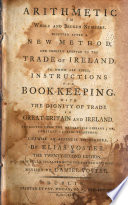 | Elias Voster - Business mathematics - 1792 - 296 pages
...any two Quantities being multiplied by the lefs, the Produfil is the greater. .A*. 5. The Rectangle of the Sum, and difference of any two Quantities, is equal' to the Difference of their Squares. Ax. 6. The Difference of the Squares of the Sum, and Difference of any two Quantities, is equal foutf... | |
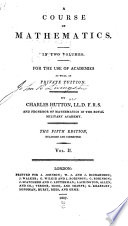 | Charles Hutton - Mathematics - 1807 - 464 pages
...diameters by the difference of the same, and that product by '7854 ; which is still the same thing, because the product of the sum and difference of any two quantities, is equal to the difference of their squares. Ex. 1. The diameters of two concentric circles being 10 and 6, required the area of the ring contained... | |
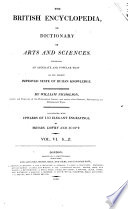 | William Nicholson - 1809 - 722 pages
...universal, which extend to any quantity, without restriction universally , as this, that the rectangle of the sum, and difference of any two quantities, is equal to the difference of their squares ; or particular, which extend only to a particular quantity ; as this, in an equilateral right-lined... | |
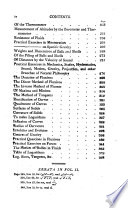 | Charles Hutton - Mathematics - 1811 - 442 pages
...by the difference of the same, and that product by •7854 ; which is still the same thing, because the product of the sum and difference of any two quantities, is equal to the difference of their squares. Ex. 1. The diameters of two concentric circles being 10 and 6, required the area of the ring contained... | |
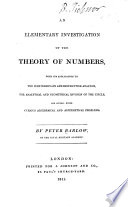 | Peter Barlow - Mathematics - 1811 - 536 pages
...number is . CHAP. VII. On the Products and Transformations of certain Algebraical Formulae. PR0P. I. 89. The product of the sum and difference of any two quantities is equal to the difference of their squares. For, - = a*-. a. ED PR0P. ir. 90. The product of a sum of t\vo sqnares, by double a square, is also... | |
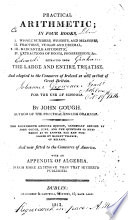 | John Gough - Arithmetic - 1813 - 358 pages
...any two Quantities being divided by either Quantity, the Quotient h the other. Ax. 5. The Reftangle of the Sum, and Difference of any two Quantities, is equal to the difference of their Squares. Ax. 6. The Difference of the Squares of the Sum, and difference of any two Quantities, is equal four... | |
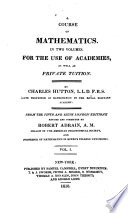 | Charles Hutton - Arithmetic - 1818 - 646 pages
...difference of the .same, and that product by -7854 ; which is still the same thing, because the product uf the sum and difference of any two quantities, is equal to the difference of their squares. Ex. 1. The diumeters of two concentric circles beimt 10 and 6, required the area of the ring contained... | |
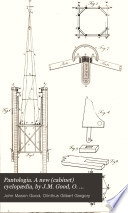 | John Mason Good - 1819 - 742 pages
...to any guiltily without restriction, universally. As this, that the rectangle or product of the SOIB and difference of any two quantities, is equal to the difference of their squares. Particular theerta, is that which extends only to a particular quantity. As this: in an equilateral... | |
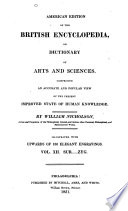 | William Nicholson - Natural history - 1821 - 356 pages
...universal, which extend to any quantity, without restriction, universally ; as this, that the rectangle of the sum and difference of any two quantities is equal to the difference of their squares; or particular, which extend only to a particular quantity ; as this, in an equilateral right-lined... | |
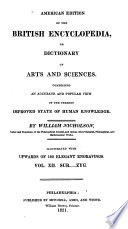 | William Nicholson - Natural history - 1821 - 356 pages
...universal, which extend to any quantity, without restriction, universally ; as this, that the rectangle of the sum and difference of any two quantities is equal to the difference of their squares; or particular, which extend only to a particular quantity ; as this, in an equilateral right-lined... | |
| |